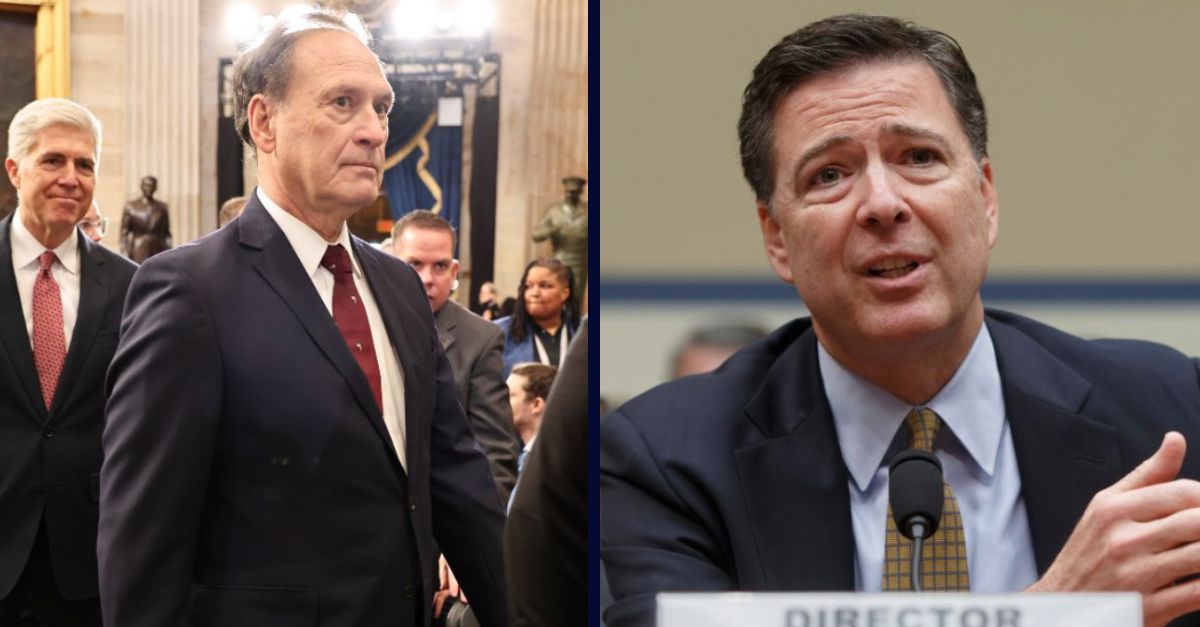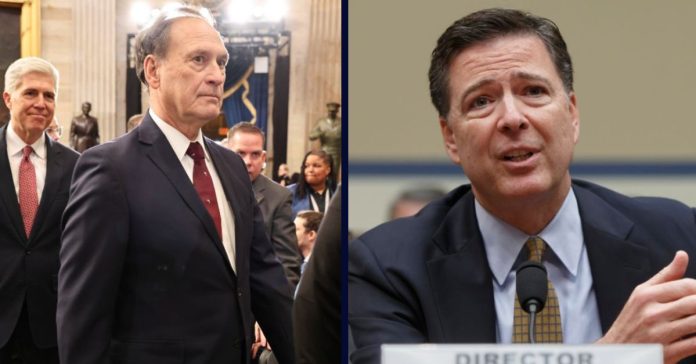
Left: U.S. Associate Supreme Court Justice Samuel Alito Jr. attends inauguration ceremonies in the Rotunda of the U.S. Capitol on January 20, 2025 in Washington, DC (Chip Somodevilla/picture-alliance/dpa/AP Images). Right: FILE – FBI Director James Comey testifies on Capitol Hill in Washington before the House Oversight Committee to explain his agency”s recommendation to not prosecute Hillary Clinton on July 7, 2016 (AP Photo/J. Scott Applewhite, File).
One of the most prominent conservative justices of today’s U.S. Supreme Court had some thoughts nearly 40 years ago while working as a lawyer inside the DOJ — thoughts that former FBI Director James Comey is citing in the hopes that it will show his President Donald Trump-approved criminal prosecution is a legal “nullity” that should be promptly dismissed.
In the lead-up to Comey’s expected motions to dismiss the false statement and obstruction case, Law&Crime noted that National Review’s Ed Whelan — a former clerk to Antonin Scalia and former DOJ Office of Legal Counsel (OLC) principal deputy assistant attorney general — penned one of the first legal critiques of the charges, focusing on the appointment of Lindsey Halligan.
Halligan, a former Florida insurance lawyer who also served as Trump’s personal attorney in his Mar-a-Lago classified documents case and in at least one failed defamation lawsuit against CNN, appeared not to have been lawfully appointed as interim U.S. attorney after the resignation of her interim predecessor Erik Siebert, according to Whelan.
Love true crime? Sign up for our newsletter, The Law&Crime Docket, to get the latest real-life crime stories delivered right to your inbox
In two September articles, Whelan reasoned that if Halligan was not validly appointed as interim U.S. attorney, as he believed, it appeared to be a “fatal legal flaw” in the case, citing the DOJ’s long-standing view that the U.S. attorney general “may not make successive interim appointments” of U.S. attorneys under federal statutory law.
That view was expressed by none other than Samuel Alito, in a 1986 opinion he wrote when he was an OLC deputy assistant attorney general. In that memorandum, Alito wrote that Congress “can place restraints on a statutory authority to make interim appointments”:
Thus, it would appear that Congress intended to confer on the Attorney General only the power to make one interim appointment; a subsequent interim appointment would have to be made by the district court. At most, it could be said that the district court has the primary authority to make subsequent interim appointments, and that the Attorney General may make such appointments only if the district court refuses to make such appointments, or fails to do so within a reasonable period.
Comey’s lawyers have now cited the very same Alito OLC opinion. According to the filing (citations removed):
It was not until 1986 that Congress for the first time gave the Attorney General a role in appointing interim U.S. Attorneys, adopting a version of the statute that mirrors the language as it exists today.
Just three days after Congress enacted the 1986 law, the Office of Legal Counsel (OLC) within the DOJ issued a memorandum, authored by then-Deputy Assistant Attorney General Samuel Alito, interpreting the provision in precisely the same manner as Mr. Comey here. Specifically, OLC concluded that while a “vacancy exists when the 120-day period expires under the amended section 546 and the President has either not made an appointment or the appointment has not been confirmed,” “it does not follow that the Attorney General may make another appointment pursuant to 28 U.S.C. 546(a) after the expiration of the 120-day period.” OLC reasoned that “[t]he statutory plan discloses a Congressional purpose that after the expiration of the 120-day period further interim appointments are to be made by the court rather than by the Attorney General.” That “contemporaneous[]” Executive Branch interpretation provides persuasive evidence of statutory meaning.
For Comey and his legal team, Alito’s words amount to the executive branch’s “longstanding interpretation dating back to the original enactment of the provision at issue,” meaning Halligan’s appointment runs “directly contrary to the statutory text, structure, history, and purpose” of the law.
“By purporting to appoint Ms. Halligan under Section 546, the President and Attorney General have disregarded that considered judgment and sought to reinstate a regime that Congress expressly repudiated,” the filing said, noting that Halligan was the only known prosecutor to present the case to a grand jury and sign the indictment mere days before the statute of limitations expired.
Beyond questions of whether the former Trump defense attorney with no prosecutorial experience was lawfully appointed, the circumstances surrounding Halligan’s installation already raised questions about her qualifications for the role. A story from Lawfare’s Anna Bower, which went viral Monday, took that scrutiny a step further.
It was revealed that the Eastern District of Virginia’s rookie interim U.S. attorney, who minored in broadcast journalism, reached out to the journalist via Signal, unsolicited, to reproach her about her reporting on the Letitia James case — while evidently operating under the assumption that the exchange Bower did not initiate was off the record.

